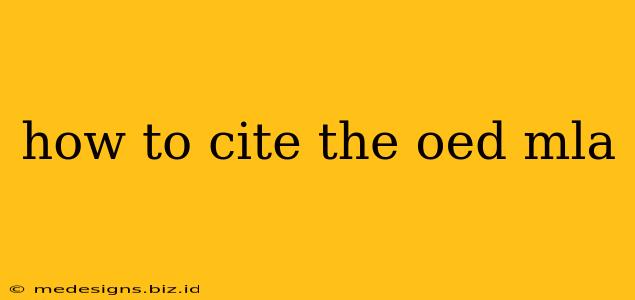How to Cite the Oxford English Dictionary (OED) in MLA Style
The Oxford English Dictionary (OED) is a treasure trove of etymological and linguistic information. Knowing how to properly cite it in your academic work, using MLA style, is crucial for maintaining academic integrity. This guide will walk you through the process.
Understanding MLA Citation Basics
Before diving into OED citations, let's briefly review the fundamental structure of MLA citations. MLA style emphasizes brevity and clarity, prioritizing the information most relevant to locating the source. Generally, an MLA citation includes the author's name (or editor's name for compiled works), the title of the work, publication information, and access information (if applicable).
Citing the OED: Print and Online Versions
The method for citing the OED varies slightly depending on whether you're using the print or online version.
A. Citing the Print OED:
For the print version, your citation will focus on the edition you consulted (remembering that the OED is constantly updated). Here's the general format:
"Entry Word." The Oxford English Dictionary. Edition Number, year of publication. Page number(s).
Example:
"Dog." The Oxford English Dictionary. 3rd ed., 2019. 678-80.
Key Considerations:
- Edition: Specify the edition (e.g., 2nd, 3rd). This is vital because the content and organization can change between editions.
- Year: Provide the publication year of the edition you used.
- Page Numbers: Always include the page range where the entry is located.
B. Citing the Online OED:
Citing the online version requires additional information to pinpoint the specific entry within the vast database. Here's the general format:
"Entry Word." Oxford English Dictionary. Oxford University Press, Accessed Day Month Year. URL.
Example:
"Serendipity." Oxford English Dictionary. Oxford University Press, accessed 24 Oct. 2023. https://www.oed.com/view/Entry/172576 (Replace with the actual URL)
Key Considerations:
- Access Date: Include the date you accessed the online entry. This is crucial because online content can change.
- URL: Provide the direct URL to the specific entry. This allows for verification.
- No page numbers: Unlike the print version, you do not include page numbers for the online version.
Specific Details within the OED Entry
Your MLA citation focuses on the entire entry. However, if you're quoting specific information within an entry, such as a particular etymology or a specific example sentence, you may want to add additional detail in your in-text citation to pinpoint your source. For example:
"According to the OED, the word 'serendipity' was first used in 1754" ("Serendipity").
This in-text citation corresponds with the above example. It allows the reader to find the relevant information quickly.
Important Reminders
- Consistency: Maintain consistency in your citation style throughout your paper.
- Accuracy: Double-check all information to ensure accuracy.
- Works Cited Page: Remember to include the full citation in your Works Cited page at the end of your paper.
By following these guidelines, you can accurately and efficiently cite the OED in your MLA-style papers, demonstrating your attention to detail and commitment to academic integrity. Remember to always consult the most recent MLA Handbook for the most up-to-date guidelines.
